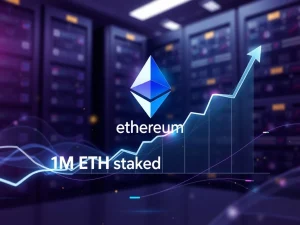Crypto Regulation: GENIUS Act Unlocks a Brilliant New Era for Digital Assets

The crypto world just wrapped up a monumental ‘Crypto Week,’ highlighted by the passage of the much-anticipated GENIUS Act. This legislative breakthrough is being hailed as a critical turning point for digital assets, but don’t uncork the champagne just yet. While regulatory clarity is certainly a cause for celebration, industry experts are quick to point out that this is merely the beginning. The real work of integrating crypto into our global financial and identity systems is only just starting. Are we on the cusp of mainstream adoption, or are there still significant hurdles to overcome? Let’s dive into what this landmark legislation means for the future of crypto regulation and beyond.
The Dawn of Clear Crypto Regulation: What Does the GENIUS Act Mean?
For years, the cryptocurrency market has grappled with a cloud of regulatory uncertainty, hindering innovation and deterring mainstream players. The GENIUS Act, officially known as the Guiding and Establishing National Innovation for US Stablecoins Act, has swept away a significant portion of that cloud. Passed with strong bipartisan support, it establishes the first federal framework for stablecoins and, crucially, formally recognizes that not all crypto assets are securities.
Leo Fan, co-founder of Cysic, succinctly captured the sentiment, stating, “Clarity is just a starting point, not an endpoint.” He emphasizes that this legal clarity is a “foundational shift,” providing a “green light for developers, investors, and institutions to build and deploy with clearer legal guardrails.” This distinction is monumental, offering the confidence builders and investors need to innovate without constant fear of regulatory repercussions. However, Fan also highlights the next frontier: the urgent need for scalable blockchains, instant verification systems, and robust trusted custody solutions to truly integrate crypto as foundational infrastructure.
Stablecoins at the Forefront: Driving Real-World Integration
One of the most immediate impacts of the GENIUS Act is its potential to supercharge the adoption of stablecoins. Altan Tutar, co-founder and CEO of MoreMarkets, describes the Act as “the best sign yet that DeFi is here to stay.” He believes this legislation will drive stablecoin adoption in a meaningful way, paving the path for the tokenization of traditional assets like gold or oil. Imagine a world where real-world assets (RWAs) are seamlessly traded on blockchain networks, bringing DeFi into entirely new territories.
While this is exciting for institutions, Tutar offers a word of caution for everyday investors. He notes that regulatory clarity often benefits large institutions more than the average person. To truly avoid a crypto version of the “dot-com bubble,” the industry must focus on building user-friendly payment systems, intuitive applications, and accessible earning opportunities for retail investors. The goal is to make crypto not just legally sound, but practically useful and appealing for everyone.
DeFi‘s Unstoppable Rise: Beyond Regulatory Hurdles
The passage of the GENIUS Act sends a strong signal: DeFi is no longer a fringe concept but a legitimate and enduring component of the financial landscape. Ryan Chow, CEO of Solv Protocol, asserts that Crypto Week “laid the legal foundation for digital assets for legal clarity and structural legitimacy,” effectively ending years of regulatory uncertainty that stalled institutional engagement. The Act’s clear distinction between decentralized digital assets and traditional securities provides an unprecedented level of confidence for builders and investors alike.
However, Chow wisely reminds us that “clarity is necessary, but credibility is what builds markets.” This means moving beyond just legal frameworks to developing truly robust and trustworthy financial products within the decentralized ecosystem. He envisions a future with “Bitcoin-backed credit, tokenized treasuries, and yield tied to real assets,” all underpinned by transparent risk pricing and compliance built-in from the ground up. This shift from mere innovation to credible, compliant financial products is crucial for DeFi’s long-term success and widespread acceptance.
Paving the Way for Widespread Institutional Adoption
The journey towards widespread institutional adoption of digital assets requires more than just legal clarity. Will K, CEO of VOOI and co-founder of Symbiosis.Finance, emphasizes that regulation is only one piece of a larger puzzle. For crypto to transition from a niche ecosystem to a global financial standard, several other critical elements must mature:
- Mature Infrastructure: Robust, secure, and scalable blockchain networks capable of handling massive transaction volumes.
- Simplified User Experiences: Intuitive interfaces and seamless processes that make crypto accessible to non-technical users.
- AI-Driven Tools: Intelligent solutions that automate tasks, enhance security, and level the playing field for all participants.
Will K’s core message resonates deeply: “The industry needs to stop building for crypto natives and start building for everyone else.” This shift in focus is vital. For institutions to fully embrace crypto, the underlying technology must be as reliable and easy to use as traditional financial systems. This means addressing concerns around security, interoperability, and user-friendliness, ensuring that the benefits of blockchain technology are accessible without requiring a deep technical understanding.
What’s Next for Crypto Regulation? The Path Ahead
The GENIUS Act is a monumental step, but as the experts consistently reiterate, it’s just a starting point. The regulatory landscape will continue to evolve, addressing new challenges and opportunities that emerge as digital assets become more intertwined with the global economy. The focus will likely shift towards how existing financial regulations can be adapted or expanded to accommodate the unique characteristics of decentralized finance, tokenized assets, and new forms of digital identity.
The collaboration between regulators, industry leaders, and innovators will be paramount. Discussions will likely center on establishing international standards, ensuring consumer protection, and fostering responsible innovation. While the initial clarity provided by the GENIUS Act offers a solid foundation, the journey towards full integration is a marathon, not a sprint. The industry must continue to build, innovate, and advocate for sensible policies that balance growth with security and stability.
In conclusion, Crypto Week and the passage of the GENIUS Act mark an undeniably exciting chapter for the digital asset space. The newfound regulatory clarity provides a much-needed boost, opening doors for greater institutional participation and the mainstreaming of stablecoins and DeFi. However, the true promise of crypto lies in its ability to integrate seamlessly with real-world finance and identity systems. This will require continuous innovation in infrastructure, user experience, and a commitment to building for a broader audience. The foundation has been laid; now, the real construction begins. The future of crypto looks brighter than ever, but it demands ongoing effort and collaboration from all stakeholders.









